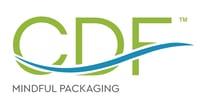Some companies have come up with brilliant solutions to the excessive packaging waste in the food industry, but the big question is whether customers are ready to make the mental shift to eating their food wrappers.
It doesn’t make sense that a single food item that gets consumed within minutes or even seconds should leave behind a piece of packaging that will linger on Earth for years. Think of a granola bar and its plastic wrapper, a mini yogurt container, a bag of chips, or a bottle of juice. These items, together with countless others, offer such fleeting satisfaction at a long-term cost, whether the destination is a landfill site or the convoluted, unreliable processes of a recycling facility.
Fortunately there is a growing number of conscientious shoppers who care about the amount of waste they generate, and who would choose not to buy the above-mentioned items precisely for the fact that packaging would go to waste following consumption. While these “Zero Wasters” make a big difference in their own lives, unfortunately their influence on the rest of society is limited.
That is where the packaging industry could step in and reinvent food packaging to be far more sustainable, perhaps even non-existent. According to an article in The Guardian, there are some really fascinating advances in the world of “waste-free, Willy Wonka packaging,” but the big question is whether consumers are psychologically ready for it. Buying apples and bagels directly from a bin at the supermarket is one thing, but sifting through a display of yogurt balls in edible skins is a different kind of experience.
Or is it? Shoppers are simply unaccustomed to seeing certain foods being sold without packaging, although they’re perfectly comfortable with other items, such as produce and baked goods, being sold loose. It’s time to get over that mental barrier.
The Guardian describes a company called WikiFoods that “wraps a vast range of foods and beverages in plastic-free and edible packages made of natural ingredients,” like the protective skins on fruits. The first commercial WikiPearls (little balls of ice cream and frozen yogurt with edible skins) launched in the U.S. and France in 2013.
Click here to read the article: http://www.packworld.com/world-not-starving-edible-packaging
Source: Packaging World
